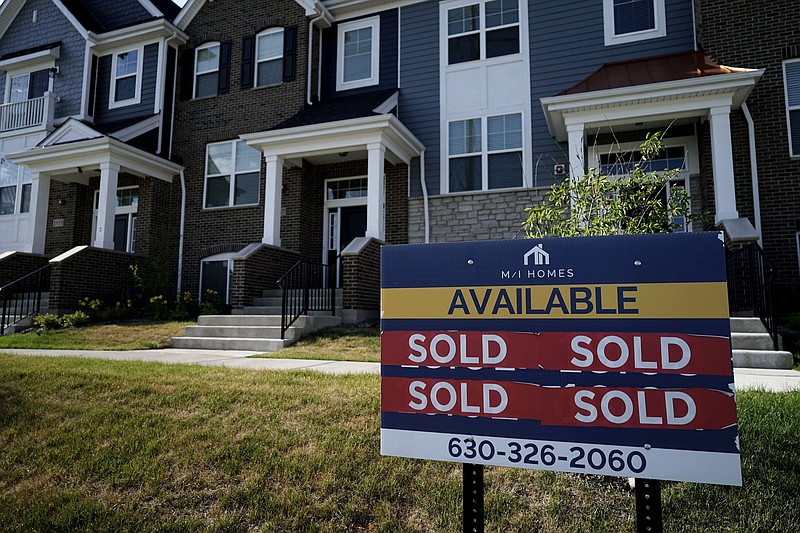Data released Thursday by Freddie Mac show the average 30-year fixed-rate mortgage increased this week for the seventh week in a row, rising to 5.11% with an average 0.8 point. (A point is a fee paid to a lender equal to 1% of the loan amount. It is in addition to the interest rate.)
The average was 5% a week ago and 2.97% a year ago. The 30-year fixed rate hasn't been this high since February 2011.
Freddie Mac, the federally chartered mortgage investor, aggregates rates from around 80 lenders across the country to come up with weekly national averages. The survey is based on home purchase mortgages. Rates for refinances may be different. It uses rates for high-quality borrowers with strong credit scores and large down payments. Because of the criteria, these rates are not available to every borrower.
The 15-year fixed-rate average climbed to 4.38% with an average 0.8 point. It was 4.17% a week ago and 2.29% a year ago. The five-year adjustable rate average grew to 3.75% with an average 0.3 point. It was 3.69% a week ago and 2.83% a year ago.
"The Freddie Mac fixed rate for a 30-year loan kept marching up this week, following the continued surge in the 10-year Treasury," George Ratiu, manager of economic research at Realtor.com, said. "Markets are also pricing in a likely 50 basis point hike at the central bank's next meeting on May 4th, so we expect mortgage rates to continue to rise."
A sharp sell-off of Treasurys has caused yields to skyrocket. And because mortgage rates are closely tied to the movement of long-term bonds, it is worth paying attention to the 10-year Treasury yield's rapid rise.
The yield on the 10-year Treasury is fast approaching 3%, a level not seen since December 2018. This week, it jumped to 2.93% on Tuesday before closing at 2.85% on Wednesday. Yields move inversely from prices. The speed of the 10-year yield's ascent has been striking.
"We saw a major sell off of mortgage-backed securities (MBS) and Treasurys (TSY) in the secondary market," Robert Heck, vice president of mortgage at Morty, an online mortgage marketplace, wrote in an email. "The selloff in bonds (when prices drop, yields go higher) year-to-date is one of the sharpest moves higher in recent history, rivaling the bond crisis of 1994."
The 10-year yield has gone up more than a percentage point since early March. Investors have been selling bonds over fears about inflation. They are concerned about the Federal Reserve increasing the size of its interest rate increases in an effort to control rising prices.
"Inflation remains rampant but it's also important that rates don't hit a level that makes it highly restrictive for people to purchase homes," Heck wrote. "It's even possible that rates could hit a ceiling over the next few weeks or months and then remain steady or even come back down from there."
Rising mortgage rates are starting to have a chilling effect on the housing market. The National Association of Realtors said this week that existing-home sales were down 2.7% last month from February and are 4.5% lower than a year ago. But Heck said concerns about a housing bubble oversimplify what's happening.
"The actions the Fed takes are designed to stamp out inflation and preserve the overall health of the economy, not tank the housing market," he wrote. "Of course, if inflation were to spiral out of control and the Fed took more aggressive action, rates could rise to a level at which they could send demand and affordability into a steep downward spiral."
It is not only rising rates that are making home loans more expensive. As of April 1, the Federal Housing Finance Agency implemented a fee increase for some Fannie Mae and Freddie Mac home loans. Mortgages that the FHFA considers "high balance" or mortgages for a second home are now more expensive.
High-balance loans are mortgages above the conforming national baseline limit ($647,200). Fees for high-balance loans increased between 0.25 and 0.75%, tiered by loan-to-value ratio. Fees for second home loans increased between 1.125 and 3.875%, tiered by loan-to-value ratio.
Bankrate.com, which puts out a weekly mortgage rate trend index, found 70% of the experts it surveyed expect rates to move higher in the coming week.
"Another week of Treasurys moving up, another week of rising mortgage rates," Ralph McLaughlin, chief economist at Kukun, said.
Meanwhile, mortgage applications were down again last week. The market composite index -- a measure of total loan application volume -- decreased 5% from a week earlier, according to Mortgage Bankers Association data.
The refinance index fell 8% and is 68% lower than a year ago. The purchase index slid 3%. The refinance share of mortgage activity accounted for 37.1% of applications.
"The recent surge in mortgage rates has shut most borrowers out of rate/term refinances, causing the refinance index to fall for the sixth consecutive week," Joel Kan, an MBA economist, said in a statement. "In a housing market facing affordability challenges and low inventory, higher rates are causing a pullback or delay in home purchase demand as well. Home purchase activity has been volatile in recent weeks and has yet to see the typical pick up for this time of the year."
Kan added: "The ARM [adjustable rate mortgage] share of applications reached 8.5% last week, its highest level since 2019. As ARM loans typically have lower rates than fixed rate mortgages, and as this spread has widened, ARM loans have become more attractive to borrowers already facing home purchase loan amounts close to record highs."
